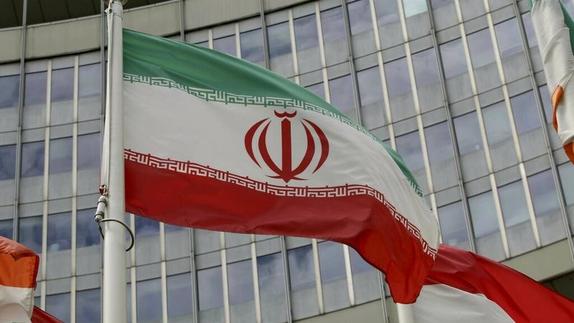 In this July 10, 2019 photo, the Iranian flag waves outside of the UN building that hosts the International Atomic Energy Agency, IAEA, office inside in Vienna, Austria. (RONALD ZAK / AP)
In this July 10, 2019 photo, the Iranian flag waves outside of the UN building that hosts the International Atomic Energy Agency, IAEA, office inside in Vienna, Austria. (RONALD ZAK / AP)
TEHRAN - The National Security and Foreign Policy Commission of Iran's parliament on Tuesday approved a plan to stop Iran's "voluntary" implementation of the Additional Protocol to the Non-Proliferation Treaty (NPT), semi-official Fars news agency reported.
Under the Iranian 2015 nuclear deal, the Additional Protocol allows UN inspectors from the IAEA to carry out more intrusive inspections of Iran's nuclear program
"Stopping implementation of the Additional Protocol, which was approved at the meeting of the parliament's commission this afternoon (on Tuesday), can also affect the future of the Iranian nuclear deal," Sara Fallahi, a member of the National Security and Foreign Policy Commission of the parliament, told Fars.
In a reaction to the recent approval of an anti-Iran resolution by the International Atomic Energy Agency (IAEA), the Iranian parliament has urged the government to reconsider the implementation of the Additional Protocol.
ALSO READ: Iran's navy seeks new base for waters leading to Indian Ocean
The IAEA's 35-nation board of governors passed a resolution on Friday, calling on Iran to cooperate fully with it and let the agency access two locations inside the country.
The board "calls on Iran to fully cooperate with the agency and satisfy the agency's requests without any further delay, including by providing prompt access to the locations specified by the agency," according to the text of the resolution submitted by France, Germany and Britain and adopted by a vote of 25 to two with seven abstentions, the IAEA said on its website.
With the vote on Tuesday, the Iranian parliament took one step closer to the final approval of the plan, which if ratified will oblige the government of President Hassan Rouhani to drop the commitments concerning the protocol.
Under the Iranian 2015 nuclear deal, also known as the JCPOA, signed by Iran and the six world powers, including the United States, the Additional Protocol allows UN inspectors from the IAEA to carry out more intrusive inspections of Iran's nuclear program.
ALSO READ: Iran vows action in response to IAEA 'unconstructive' resolution
Earlier on Tuesday, the National Security and Foreign Policy Commission of Iran's parliament in a statement condemned the recent anti-Iran resolution of the IAEA as "politicized and unprofessional."
"Over the past years, Iran has been more cooperative with the IAEA than other member states," said the Iranian parliament's statement.
However, "the IAEA adopted the anti-Iran resolution under the political and unprofessional pressures of the United States and its allies," it said.
The statement noted that the IAEA has adopted the resolution based on the allegations by the Israeli intelligence service.
"It is for the world to know if Iran gives positive response to the IAEA demand, which is based on the alleged intelligence, to access (the locations inside Iran), it will help create a wrong attitude towards other states," it added.
Iran will not allow the international institutions to be used as instruments by the United States and its allies to threaten the country's sovereignty, the statement stressed.
READ MORE: IAEA resolution 'harmful to global non-proliferation regime'
Iran's permanent representative to international organizations in Vienna, Kazem Gharibabadi, on Friday slammed the IAEA for adopting a resolution against Tehran, saying that "adoption of this resolution will neither encourage Iran to grant access to the Agency based on fabricated and unfounded allegations nor will it force Iran to come down from its principal positions."
"Iran will take appropriate action in response, the repercussions of which would be upon the sponsors of this resolution," said Gharibabadi.
After the US withdrawal from the JCPOA in May 2018, Iran began to gradually reduce its commitments under the pact to retaliate Washington's departure and to respond to Europeans' "failure to honor their commitments."
On January 5, Iran took a fifth and last step in reducing its commitments and said it would no longer observe any operational limitations on its nuclear program concerning the capacity and level of uranium enrichment, as well as the volume of stockpiled uranium or research and development.
Nuclear plant overhaul
Iran also overhauled the Bushehr Nuclear Power Plant (BNPP) for the first time and reconnected it to the national grid, the Atomic Energy Organization of Iran (AEOI) said Tuesday.
"For the first time, the annual fuel change and periodic repairs of the main equipment at BNPP were carried out by the capable specialists of this advanced nuclear power plant, and it was reconnected to the national electricity grid after successful tests," the AEOI said in a statement.
"With the beginning of the summertime peak consumption period, the plant successfully resumed electricity generation on Sunday and hooked up with the national electricity grid," it added.
READ MORE: China urges US to stop wrong moves on Iran nuclear issue
The plant was shut down in early April for fuel change and maintenance by Iranian technicians, Press TV reported.
Behrouz Kamalvandi, AEOI spokesman, said in May that Iran would probably cut its dependence on Russian engineers and become self-sufficient in maintenance of the Bushehr plant by 2022.
Iran's first 1,000-megawatt BNPP was completed by Russia in May 2011.
Iran and Russia later agreed to continue to develop the Bushehr plant. According to the agreement, the second phase would consist of two units with a cumulative output capacity of 2,100 megawatts.


